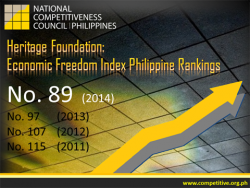- Home
- |
- About Us
- |
- Working Groups
- |
- News
- |
- Rankings
- WEF-Global Competitiveness Report
- Ease of Doing Business Report
- IMD-World Competitiveness Yearbook
- TI-Corruption Perceptions Index
- HF-Economic Freedom Index
- WEF-Global Information Technology Report
- WEF-Travel and Tourism Report
- WIPO-Global Innovation Index
- WB-Logistics Performance Index
- FFP-Fragile States Index
- WEF-Global Enabling Trade Report
- WEF-Global Gender Gap Report
- Gallery
- |
- Downloads
- |
- Contact Us
Philippines Up 8 Notches in Economic Freedom Index

The National Competitiveness Council is pleased to report that the Philippines moved up eight notches from No. 97 to No. 89 out of 178 ranked countries in the 2014 Index of Economic Freedom.
Published annually by the Wall Street Journal and the Heritage Foundation, the Index measures “a nation’s commitment to free enterprise” and scores economies in ten categories, covering a broad range of factors including court system efficiency, tax rates, investment restrictions, and licensing requirements. Based on the average of these scores, economies are then classified as “free” (score of 80 or higher), “mostly free” (70-79.9), “moderately free” (60-69.9), “mostly unfree” (50-59.9), or “repressed” (below 50).
The Philippines’ score of 60.1 classifies it as “moderately free”, an upgrade over last year’s score of 58.2 or “mostly unfree”.
This year, the Philippines improved its rank in the following: business freedom (up 23, from No. 135 to No. 112), investment freedom (up 18 from No. 98 to No. 80), monetary freedom (up 9, from No. 73 to No. 64), government spending (up 6, from No. 10 to No. 4), property rights (up 1, from No. 94 to No. 93), and freedom from corruption (up 1, from No. 127 to No. 126). There was no change in financial freedom (No. 69).
The country slipped in labor freedom (down 13, from No. 128 to No. 141), fiscal freedom (down 8, from No. 88 to No. 96), and trade freedom (down 2, from No. 93 to No. 95).
The report noted that this was the third consecutive year the Philippines has improved its overall standing. The total gain is now 26 places, up from No. 115 in 2011. This makes the Philippines the most improved economy in ASEAN and the third most improved economy in the world in the last three years.
NCC Private Sector Co-Chairman Guillermo M. Luz stated that the Philippines was well on-track to hit its target to be in the top one-third of global rankings by 2016. “The improvements in business freedom and investment freedom, in particular, should help attract more attention from foreign investors interested in coming to the Philippines,” he added.
In the Wall Street Journal, Terry Miller, Director of the Center for International Trade and Economics at the Heritage Foundation, wrote that “countries achieving higher levels of economic freedom consistently and measurably outperform others in economic growth, long-term prosperity and social progress”.
While the Philippines currently enjoys the growth accompanying an upward trend on economic freedom, it must continue to pursue “a deeper commitment to reform” to sustain the upswing. Presidential Spokesperson Edwin Lacierda welcomed the positive evaluation and added that the administration is now more determined than ever to implement lasting reforms founded on good governance and true public service.

